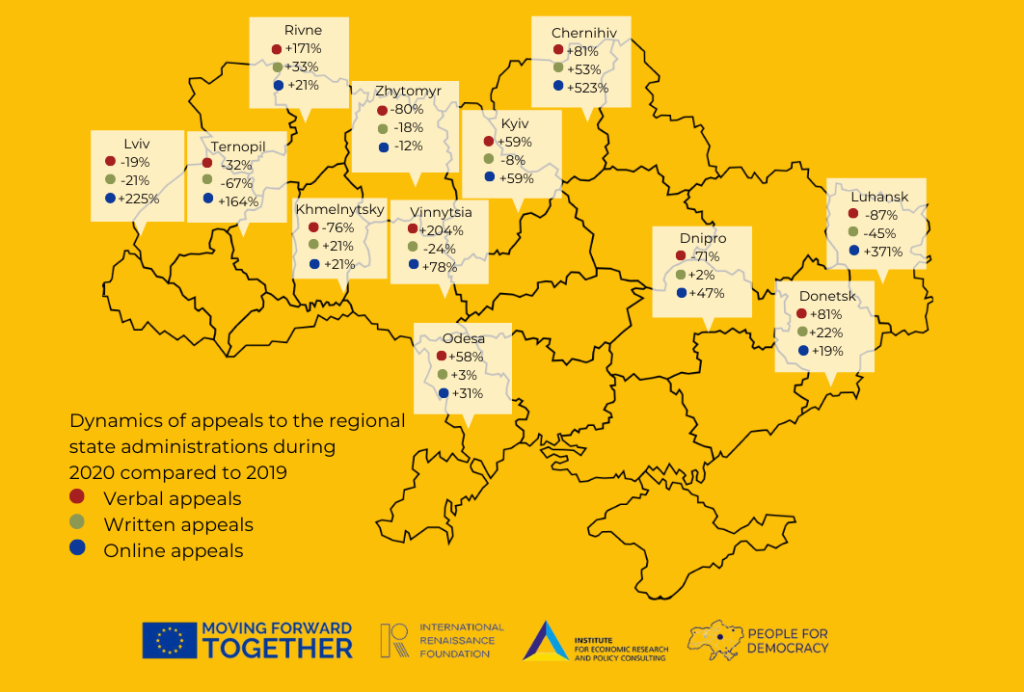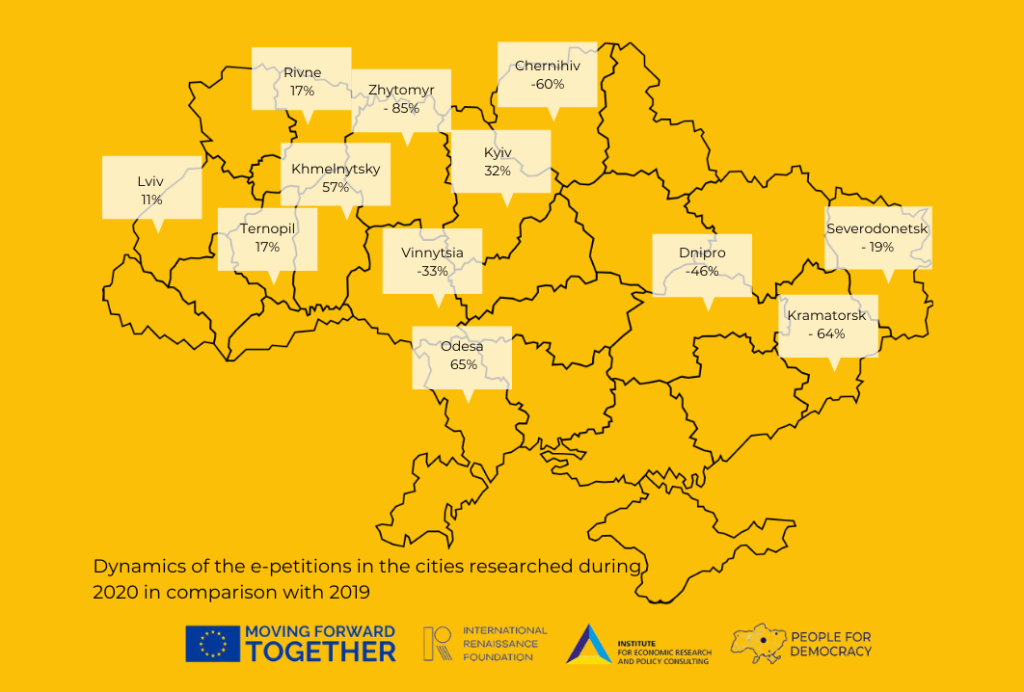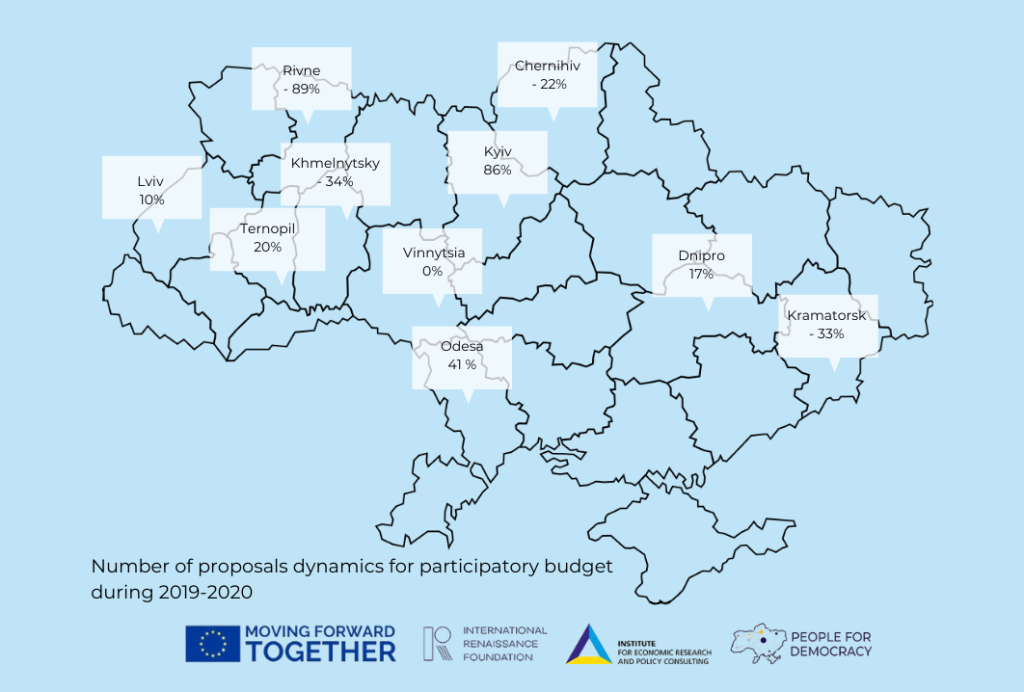The COVID-19 pandemic affected most areas of Ukrainian life. A study by the Institute for Economic Research and Policy Consulting (IER) found that during the pandemic, traditional methods of communication of civil society with the authorities have declined significantly, especially those involving face-to-face meetings.
Instead, the tools of e-democracy became widespread. These tools increase the audience which can communicate with the authorities but can also delay communication when questions are sent by e-mail or chat.
In this article, I will focus on the mechanisms of cooperation between authorities and the public, their changes during the pandemic.
International Experience
Globally, two trends have had a decisive influence on the cooperation of local authorities and the public.
The first trend was the introduction of quarantine restrictions of various degrees of severity. They became a significant barrier to cooperation between the government and the public, as most discussions, roundtables, and other events involve face-to-face meetings.
Quarantine restrictions have also hit local budgets hard due to reduced economic activity, the purchase of medical equipment, and business support spending. As a result, for example, in 2020, no public budget project was held in Seattle.
In response to quarantine restrictions, the second trend that changed the way government and the public communicate is digitalization. This process began before the pandemic, but at that time it developed mainly in the business sphere. After the introduction of bans on personal meetings and mass events, European authorities began to use more widely available ready-made digital solutions for communication with the public.
Ukrainian Experience
Due to the COVID-19 pandemic, we have been living for two years in a situation where quarantine restrictions are constantly changing. The government had to balance between supporting economic activity and quarantine restrictions.
Because of this, both local authorities and the public had to adapt to the new conditions. Most of the activities, which provided for personal communication, became impossible during the period of severe quarantine. The solution was to use electronic means of communication, which became very popular.
Some authorities have begun to broadcast their meetings or hold them online. Such innovations depended heavily on the quality of Internet coverage and community resources. There have also been negative examples of local authorities using the pandemic as an excuse to reduce communication with the public.
Another tool that changed significantly during this time is citizens’ appeals, especially appeals at personal receptions. During the period of severe quarantine most local authorities were forced to suspend personal receptions of citizens. In such a situation, residents should be informed about their rights and other possibilities to communicate with authorities.
For example, it should be explained that there are different types of appeals (suggestions, statements, complaints), which have different functions, different deadlines for responses. Or that one needs to know the appeal number, if it is made by phone, to be able to track the status of its execution.
The IER study showed that the number of online appeals has increased significantly in almost all regions of Ukraine. The largest increase was observed in the Luhansk Regional State Administration – almost five times. Zhytomyr was the only one among the surveyed regional state administrations where the number of online appeals decreased in 2020 compared to 2019.
In addition to appeals, the Internet can also be used to organize personal receptions. For example, the head of the Lutsk City Council during a period of severe quarantine held personal receptions using electronic means of communication. This method helped to solve the problems of the citizens faster than if it happened through a letter to the city council.
The use of the Internet to communicate with the authorities is becoming more widespread and popular, and the trend towards further digitalization of public services will continue. At the same time, it is important to remember and maintain traditional communication methods. After all, only 15% of Ukrainians over the age of 60 use smartphones.
Another tool of local democracy that can function effectively in a pandemic is electronic petitions. Their advantages are significant time savings and absence of personal contacts.
The number of electronic petitions during the COVID-19 pandemic increased in most regional centers in western Ukraine, while their use decreased in the east. As in the situation with online appeals, Zhytomyr again set an “anti-record”: it had the largest reduction in the number of electronic petitions.
The process of collecting the required number of votes to support the petition in most Ukrainian cities remains quite complex. In Kyiv in 2020, only two petitions received enough signatures, in 2019 – only one. In addition, gaining the required number of votes for the petition guarantees only its consideration, not resolution. Therefore, in Ukraine, electronic petitions inform the authorities about the problem rather than solve it.
One of the instruments of local democracy that has suffered the most from pandemic and quarantine restrictions is the public budget. It is used for the public to participate in the distribution of local budget funds through the funding of public projects submitted to the competition.
Due to the pandemic, it has become difficult to hold public discussions of such projects. In addition, Ukrainian cities have faced the same financial problems as cities in other countries: reduced local budget revenues and increased pandemic spending.
Our study showed that even during the pandemic, most regional centers continued to accept projects for competition. In the largest cities (Kyiv, Dnipro, Odesa, Lviv) the number of submitted proposals for the public budget increased, in smaller regional centers (Rivne, Chernihiv, Kramatorsk) the public was less active in submitting applications.
Conclusions and Recommendations
COVID-19 has negatively affected the tools of local democracy, especially those involving face-to-face meetings and mass events. However, most institutions have been transformed to operate in a pandemic.
The transition to digital communication between state and local authorities and the public has greatly expanded the audience, but at the same time made it more difficult to provide feedback due to “one-sidedness”. Often, citizens who watched authorities’ meetings online could not ask speakers questions.
Due to the low proportion of fully vaccinated citizens and the increase in detected cases of the “Delta” strain of coronavirus, we can expect a new wave of the disease. Therefore, society and the authorities must be ready to cooperate in conditions of potential quarantine:
- Preserve alternative methods of citizen participation in community affairs, as different age groups use different ways of cooperating with the authorities.
- Inform citizens through various communication channels for faster response from citizens and greater efficiency of decisions.
- Reduce the digital and information gap between citizens, especially in rural areas.
This article was prepared within the framework of the project “People for Democracy” with the assistance of the European Union (https://tinyurl.com/ywt3yveh), which is implemented by the Institute for Economic Research and Policy Consulting. The contents of this publication are the sole responsibility of the Institute for Economic Research and Policy Consulting and can in no way be taken to reflect the views of the European Union.






